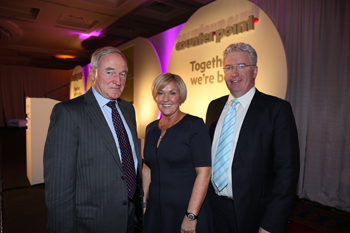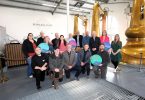Britvic Licensed Wholesale now Counterpoint
Vintners attending a conference hosted by Britvic Licensed Wholesale’s new moniker ‘Counterpoint’ were given an overview of the Irish economy to date by MC David McWilliams followed by a number of speakers who gave their views as to where the pub might go from here.
The economy has picked up in the last few months and Ireland is almost at the “tipping point”, said economist David McWilliams, but ‘debt versus consumer spend’ still looms large on the retail scene. For the pub business this means balance sheets continue to be stretched.
“Nevertheless, some positives are not being picked up on, so it’s a question of being ready for the changes that’ll be coming down the line,” he said.
New York publicans’ experience
In light of the troubled economy, Counterpoint’s Marketing Manager Debbie Vard told the conference that everyone has had to change their game to fight for their share of spend. For Britvic, this has resulted in a change of name to ‘Counterpoint’ to reflect a new game-changing approach.
With a 42% brand share in the soft drinks market, Counterpoint wants to develop into other categories.
“We’re now looking at consumer trends such as drinking at home” she said, “and wondering ‘How do we attract people back into the pub?’”
The company conducted some research among 40 Irish publicans with 50 pubs (including one of the largest in Manhattan) between them in New York as a comparison.
Interestingly there are more pubs per head of population in New York than in Dublin.
New York plans
All publicans spoken to drive footfall through customer service. They pick bartenders like key players in a soccer team. They know which personality goes with which to create the appropriate atmosphere.
They also visit other pubs seeking out the positives and only want staff who’d want to drink there themselves. Local bars also help create more of a draw to the district by working together.
Everything from lighting levels, to glassware quality, to ice, to flowers and candles on the table, is carefully thought-out and planned in.
“When someone walks into your premises you’ve five seconds to convert them into a sale,” said one, “Irish pubs are so successful in New York because we’ve a welcoming atmosphere.”
Another publican, whose food offering is that bit different, asked, “Why have so many pubs the same food offering?”
All agree that the customer would forgive a pub anything but bad service.
New York cocktails
Here at home, three major trends dominate the Irish on-trade market: wine, cocktails and craft beers.
“The first two are geared towards the female market but are not as present in pubs as they should be,” said Debbie Vard, “And how do you serve a good cocktail when you’re three-deep at the bar?”
In New York, hand-crafted cocktails get the customer’s attention and as the bartender’s performing for the guest, the bar tends to use premium product.
There’s been a huge upswing in demand for cocktails in New York lately. Infused-based cocktails are also proving popular – gin with fresh ginger etc allow a bar to make its own signature drink.
Offering differentiation
From what have been standard well-known brands of beer there has been an upsurge in microbreweries across the US.
Some NY pubs have a seasonal beer list ready to go for every season.
Others feel that by putting a wine rack behind each bar and by changing both the wine list and the wine glasses it has made a big difference to the people buying wine.
Local demographics have been examined too. One proprietor explained that his neighbourhood is 53% female: “We’d be out of business if we didn’t take account of that”.
One of the New York pubs, the Brass Monkey, provides four different wine lists at four different times of the day.
Here in Ireland we consume about nine million cases of wine a year of which 1.7 million sells via the hospitality trade, pointed out Debbie Vard, adding, “Pubs are selling around 356,000 cases and the wine market has doubled in the last 12 years, unique to this category”.
Food
Provenance is becoming increasingly important to the Irish consumer and there’s also opportunity in varying the offer – lunchtime versus evening customer profiles etc.
“Have you a number of menus for throughout the day?” she asked, “Because food drives footfall and offering soft drinks with food can increase turnover on soft drinks by 40%.”
For New York publicans their foodservice offers the opportunity to upsell. Food is becoming a crucial part of the pubs’ offering there, right down to menu flexibility or the presentation of French Fries. One NY proprietor explained, “We had construction guys working locally so we had to adapt our menu and prices to suit for that period”.
Some feel that food prices should be kept reasonable as a bigger margin can be struck on the accompanying drink order.
Snackfood & time in the pub
Counterpoint’s research here at home indicates that Irish consumers purchasing crisps and snack-nuts will spend more.
It finds that consumers spend an average of 86 minutes in the pub.
This rises to 95 with a meal but snackfoods can extend the customer stay to 107 minutes.
Display is important too.
66% of consumers purchase crisps after noting them on display, 30% buy them on impulse and 45% would most likely buy crisps if offered them by bar staff.

Attending the conference were (from left): Counterpoint Director Brian Farrell with Marketing Director Debbie Vard and Managing Director Finbarr O’Doherty.
Game-changing moments
The conference also heard from Gerry Hussy, a clinical psychologist and performance coach, about game-changing moments in business.
“The competition to the pub is changing rapidly but we need not move in the same way as our competitors,” he told the conference, adding that old models and methods were no longer “fit for purpose”.
What you do in your pub just gives you the baseline like everyone else, he said, it doesn’t distinguish you.
The ‘how’ of game-changing involves game-changing moments and publicans have to empathise with those game-changing moments.
“If the momentum isn’t what you want, game-change,” he advised, “If your standards of service only meet your expectations, you’ve failed.”
He also pointed out, “We’re in the people-changing business regardless of what we sell. Understand buyers’ behaviours and willingness to extend beyond their current behaviours”.
Share your vision with your staff
It’s important to share your vision for the business with your staff so they know where your aim lies.
“When the owner, manager and trainee all share the same goal and same vision, it’s unstoppable.”
From a customer perspective, people don’t judge a hotel on the cost of staying there but on the value they receive, he said.
“Do you monitor buyers’ expectations and willingness to spend more if the offer is right?” he asked, “Do your staff buy into that?”
A future in whiskey
Businessman John Teeling of the Irish Whiskey Company closed the afternoon’s speakers by talking about his favourite subject, the growth of Irish whiskey worldwide.
There had been a 27% growth in Irish whiskey sales in the US indicating Irish whiskey’s ongoing potential.
By 2016 the Irish whiskey market in Russia will be a one million case market, greater than the entire whiskey market here at home.
The Asian market has taken to brown spirit to the point that about 330 million cases of whisky are sold in India. Set this against worldwide sales of Irish whiskey at present totalling just six million, he said.
The good news for Irish whiskey exports is that in just 10 to 15 years one billion people will be entering the middle classes and will seek to purchase quality spirits such as Irish whiskey.
And some 82% of Chinese tourists go abroad to shop.
“They’ll want – and be quite happy to pay for – their own whiskey at a starting price of €500 a bottle,” he claimed.








